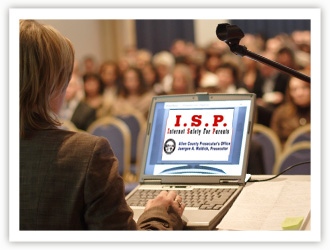


Educational Presentations
Allen County Prosecutor Destiny R. Caldwell and her staff are available to speak to community groups and organizations on topics of interest relating to the criminal justice system and Internet safety. Through such educational presentations, the prosecutor’s office seeks to provide the general public with a better understanding of the justice system, as well as promoting greater safety for at-risk groups such as children or the elderly.
 Presentations may focus on the functions of the prosecutor’s office, child abuse, juvenile justice, drug crimes and investigation, a criminal justice system overview, or Internet-related topics such as online safety and cyber-bullying.
Presentations may focus on the functions of the prosecutor’s office, child abuse, juvenile justice, drug crimes and investigation, a criminal justice system overview, or Internet-related topics such as online safety and cyber-bullying.
Entities such as schools, business groups, community organizations and clubs should feel free to contact the Allen County Prosecutor’s Office to inquire about scheduling a speaker.
To request a program click here or call 419-222-2462.
Internet Safety for Parents
Introduction
Dear Parents,
We value our children’s future and safety above all else. They are, unfortunately, the most vulnerable among us. In recent years the very advances in computer and internet technology that have opened vast areas of knowledge have also left our children exposed to potential internet predators. The rapid pace of technology has created a “techno-gap” between parents and their children. Chat-room conversations instant messaging, social networking sites and sexting between children is as common today as passing notes to a friend was a few short years ago. The lingo used in chat and instant messaging has developed into a language unto itself, not easily understood by parents.
Predators on the internet know how to take full advantage of that “techno-gap”. It is out of this realization and rise of internet related cases in our community that we have developed this content. I hope that the information contained herein will help close the “techno-gap” and make the internet a safer place for our children.
Destiny R. Caldwell
Allen County Prosecutor
Internet Safety for Parents (I.S.P.)
When your child posts information online, strangers can see it. You should see it too! Since the entire world can read it, you are not invading their privacy.
Talk to our kids. Ask questions. Discuss the dangers and future consequences with your child.
Ask to see your child’s profile page. Teach your child what they should (and should not) post online.
Make a family contract about safe computer and internet use.
Put the computer in an open area of the house. Make sure the computer is in full view at all times.
If you child does not follow your rules, unplug the computer!
Use your internet service provider’s filtering features.
Install monitoring software on your computer to check your child’s internet activity.
Work with others in your community to monitor what children are posting on the internet.
Report criminal behavior to the law enforcement, such as:
- The National Center for Missing and Exploited Children CyberTipline at: www.cybertipline.com
- The Internet Fraud Complaint Center at: www.ic3.gov
 Check out more tips: www.wiredsafety.org
Check out more tips: www.wiredsafety.org
Tips for Teens
Don’t share your password. Protect it!
Never “friend” a person that you do not know in real life.
Any information you post online is available to your parents, you teachers, strangers, and predators. Be careful!
Once you post something on the internet, it stays forever. Only post things you could attach to job applications.
Be aware of what your friends are posting about you.
Never say anything online that you wouldn’t say in real life.
Sexting Tips for Parents
Sending text messages with nude pictures, or “sexting” is dangerous. Here are some tips for parents:
 Tell them why sending naked photos of yourself is bad.
Tell them why sending naked photos of yourself is bad.
- Sending a sexually explicit picture is considered child pornography.
- Once a picture is posted on the internet, you can never take it back.
Use your cell phone company’s parental controls.
Drop picture services from your cell phone plan.
Check your child’s digital camera and photos stored on the computer.
Search the internet for pictures of your child.
- Google your child’s name surrounded by quotes (ex. “Jimmy Smith”) or your child’s phone number (ex: “419-555-5555”) to see if your child has any inappropriate pictures on the web.
Kids Rules for Online Safety
- I will not give out personal information such as my address, telephone number, parent’s work address/telephone number or the name and location of my school without my parent’s permission.
- I will tell my parents right away if I come across any information that makes me feel uncomfortable.
- I will never agree to get together with someone I “meet” online without first checking with my parents. If my parents agree to the meeting, I will be sure that it is in a public place and bring my mother or father along.
- I will never send my picture or anything else without first checking with my parents.
- I will not respond to any messages that are mean or in any way make me feel uncomfortable. It is not my fault if I get a message like that. If I do, I will tell my parents right away so that they can contact the service provider.
- I will talk with my parents so that we can set up rules for going online. We will decide upon the time of day that I can be online, the length of time I can be online and appropriate areas for me to visit. I will not access other areas or break these rules without their permission.
- I will not give out my internet password to another person other than my parents even my best friends.
- I will check with my parents before downloading or installing software or doing anything that might hurt our computer or jeopardize our family’s privacy.
- I will be a good online citizen and not do anything that hurts others or is against the law.
- I will help my parents have fun and learn things online and teach them things about the internet, computers and other technology.
Chatrooms
Did you know that Chat is the most dangerous Area on the Internet?
 Chatrooms let people engage in a live conversation with people around the block or around the world. It’s like being on a party line, only you type instead of talk. Everyone in the “chatroom” can see everything you type so never say anything in a chatroom that you wouldn’t say in public. It’s not uncommon for people to make “friends” in chatrooms but chatrooms are sometimes used by people to exploit others. Even teens your own age could pose a threat, harass or bully you. Unfortunately chatrooms are sometimes used by child molesters to find victims.
Chatrooms let people engage in a live conversation with people around the block or around the world. It’s like being on a party line, only you type instead of talk. Everyone in the “chatroom” can see everything you type so never say anything in a chatroom that you wouldn’t say in public. It’s not uncommon for people to make “friends” in chatrooms but chatrooms are sometimes used by people to exploit others. Even teens your own age could pose a threat, harass or bully you. Unfortunately chatrooms are sometimes used by child molesters to find victims.
It can be tempting to get together with someone you meet in a chatroom, but remember – people are not always who they seem to be.
Never give out personal information, and never arrange a face-to-face meeting with someone you meet in a chatroom without first checking with your parents.
Danger Signs and Possible Causes
- Spending large amounts of time online – an indication that an area of excitement of forbidden risk has been discovered.
- Minimizing the screen or clicking to different screens – inappropriate content being viewed or an improper contact taking place.
- Staying up late – kids waiting until parents are not around to engate in dangerous behavior.
- Shutting others out – online relationships are more likely to occur when alone.
- Excessive time in chat rooms or instant messaging – strangers trying to isolate your child and grooming the child for a “real life” meeting.
- Unusual mail is discovered – an online predator trying to make real life contact.
- Excessive use of mobile phones – an online relationship may have transformed into a real relationship.

